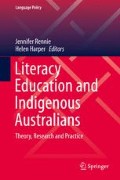Abstract
Remote Indigenous communities are often seen as challenging places in which to teach for a range of reasons. Student attendance is erratic, and teachers can feel that their work is not effective. Additionally, remote communities are culturally as well as geographically very isolated, with limited access to services (Price K, Teacher education for high poverty schools. Springer, New York, 2016). Hence, it is often difficult to attract and retain teachers, and those teachers who do take up jobs in remote schools may not feel they have been adequately prepared to work in those settings. In recent years, universities and education departments have put in place a number of initiatives to attract and retain “good” teachers in these communities. For example, several universities offer placement experiences for pre-service teachers to help them develop some understanding of what it means to work and live in remote communities and for them to develop their pedagogical skills to work effectively with Indigenous learners. In this chapter we examine the kinds of knowledge and skills that pre-service teachers need in order to work in the literacy space in remote schools. Our study refers to data from interviews with pre-service teachers, community members and school personnel. It focuses on preparedness for teaching literacy in remote settings, the disconnects between the pre-service curriculum and the expectations of schools and departments and pre-service teachers’ expectations versus the realities of their lived experience on community. Data is drawn from a broader study which sought to understand how we might better plan, implement and prepare pre-service teachers for remote teaching placements so that we might provide guidance for universities, jurisdictions and policy-makers.
Access this chapter
Tax calculation will be finalised at checkout
Purchases are for personal use only
References
ACARA. (2017). My School. Australian Government. Retrieved from, https://www.myschool.edu.au/
AITSL. (2011). Australian Professional Standards for Teachers. Retrieved from, https://www.aitsl.edu.au/docs/default-source/apst-resources/australian_professional_standard_for_teachers_final.pdf
Anderson, P. J., & Atkinson, B. (2014). Closing the gap: Using graduate attributes to improve Indigenous education. International Education Journal: Comparative Perspectives, 12(1), 135–145.
Auld, G., Dyer, J., & Charles, C. (2016). Dangerous practices: The practicum experiences of non-Indigenous pre-service teachers in remote communities. Australian Journal of Teacher Education, 41(6), 165–179.
Australian Bureau of Statistics (ABS). (2013). Retrieved from, http://www.abs.gov.au/ausstats/abs@.nsf/mf/3238.0.55.001
Brasche, I., & Harrington, I. (2013). Promoting teacher quality and continuity. Tackling the disadvantages of remote Indigenous schools in the Northern Territory. Australian Journal of Education, 56(2), 110–125.
Commonwealth of Australia. (2018). Department of the Prime Minister and Cabinet, Closing the Gap Prime Minister’s Report.
Cowey, W. (2005). A brief description of the national accelerated literacy program. TESOL in Context, 15(2), 3–14.
DEEWR. (2011). Guiding principles for developing indigenous cultural competency in Australian Universities. Retrieved from https://www.universitiesaustralia.edu.au/uni-participation-quality/Indigenous-Higher-Education/Indigenous-Cultural-Compet#.WbX9BIc0Mbw
Engelmann, S., & Engelmann, T. (1966). Give your child a superior mind. New York: Simon & Schuster.
Gray, B. (2007). Accelerating the literacy development of indigenous students: The National Accelerated Literacy Program (NALP). Darwin: Charles Darwin University Press.
Guba, E., & Lincoln, Y. (1981). Effective evaluation. San Francisco: Jossey-Bass.
Labone, E., Cavanagh, P., & Long, J. (2014). Critical design features of pre-service education programs to enhance teacher capacity to effectively work in schools with Indigenous students. The Australian Journal of Indigenous Education, 43(2), 121–133.
Moreton-Robinson, A. M., Singh, D., Kolopenuk, J., Robinson, A., & Walter, M. (2012). Learning the lessons? Pre-service teacher preparation for teaching Aboriginal and Torres Strait Islander students (A report prepared for the Division of Indigenous Education and Training Futures). Brisbane: Queensland Department of Education, Training and Employment, Indigenous Studies Research Network, and Queensland University of Technology.
Osborne, B. (2003). Preparing preservice teachers’ minds, hearts and actions for teaching in remote Indigenous contexts. The Australian Journal of Indigenous Education, 31, 17–24.
Price, K. (2016). More Aboriginal and Torres Strait Islander Teachers for Australian High-Needs Schools. In J. Lampert & B. Burnett (Eds.), Teacher education for high poverty schools (pp. 95–114). New York: Springer. https://doi.org/10.1007/978-3-319-22059-8_1.
Rennie, J., White, S., Anderson, P., & Darling, A. (2018). Preparing teachers to work with and for remote indigenous communities: Unsettling institutional practices. In D. Heck & A. Ambrosetti (Eds.), Teacher education in and for uncertain times (pp. 113–127). Singapore: Springer.
Robinson, G. W., Rivalland, J., Tyler, W. B., Lea, T., Bartlett, C., et al. (2009). The National Accelerated Literacy Program in the Northern Territory, 2004–2008: implementation and outcomes: Final evaluation report. Casuarina: School for Social and Policy Research, Charles Darwin University.
Senate Employment, Workplace Relations, Small Business and Education References Committee. (2000). Katu kalpa: Report on the inquiry into the effectiveness of education and training programs for indigenous Australians [Parliamentary papers/Parliament of the Commonwealth of Australia, 0727–4181.]. Canberra: ACT.
Sharplin, E. (2002). A taste of country: A pre-service teacher rural field trip. Education in Rural Australia, 20(1), 17–23.
Wilson, B. (2014). A share in the future: Review of indigenous education in the Northern Territory. Darwin: NT Department of Education. Retrieved from, file://ad.monash.edu/home/User075/jrennie/Desktop/A-Share-in-the-Future-The-Review-of-Indigenous-Education-in-the-Northern-Territory.pdf
Yarrow, A., Ballantyne, R., Hansford, B., Herschell, P., & Millwater, J. (1999). Teaching in rural and remote schools: A literature review. Teaching and Teacher Education, 15, 1–13.
Author information
Authors and Affiliations
Corresponding author
Editor information
Editors and Affiliations
Rights and permissions
Copyright information
© 2019 Springer Nature Singapore Pte Ltd.
About this chapter
Cite this chapter
Rennie, J., Anderson, P.J. (2019). Preparing Pre-service Teachers to Teach Literacy in Remote Spaces. In: Rennie, J., Harper, H. (eds) Literacy Education and Indigenous Australians. Language Policy, vol 19. Springer, Singapore. https://doi.org/10.1007/978-981-13-8629-9_9
Download citation
DOI: https://doi.org/10.1007/978-981-13-8629-9_9
Published:
Publisher Name: Springer, Singapore
Print ISBN: 978-981-13-8628-2
Online ISBN: 978-981-13-8629-9
eBook Packages: EducationEducation (R0)

